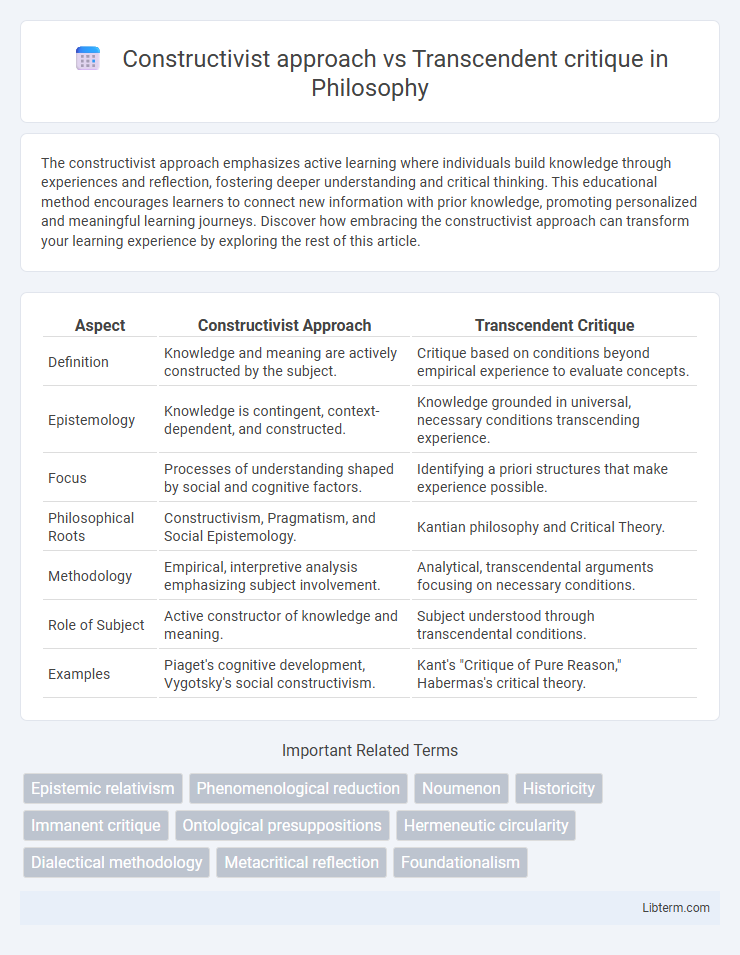The constructivist approach emphasizes active learning where individuals build knowledge through experiences and reflection, fostering deeper understanding and critical thinking. This educational method encourages learners to connect new information with prior knowledge, promoting personalized and meaningful learning journeys. Discover how embracing the constructivist approach can transform your learning experience by exploring the rest of this article.
Table of Comparison
| Aspect | Constructivist Approach | Transcendent Critique |
|---|---|---|
| Definition | Knowledge and meaning are actively constructed by the subject. | Critique based on conditions beyond empirical experience to evaluate concepts. |
| Epistemology | Knowledge is contingent, context-dependent, and constructed. | Knowledge grounded in universal, necessary conditions transcending experience. |
| Focus | Processes of understanding shaped by social and cognitive factors. | Identifying a priori structures that make experience possible. |
| Philosophical Roots | Constructivism, Pragmatism, and Social Epistemology. | Kantian philosophy and Critical Theory. |
| Methodology | Empirical, interpretive analysis emphasizing subject involvement. | Analytical, transcendental arguments focusing on necessary conditions. |
| Role of Subject | Active constructor of knowledge and meaning. | Subject understood through transcendental conditions. |
| Examples | Piaget's cognitive development, Vygotsky's social constructivism. | Kant's "Critique of Pure Reason," Habermas's critical theory. |
Defining the Constructivist Approach
The Constructivist Approach defines knowledge as actively constructed by individuals through experience and reflection, emphasizing the role of learners in creating meaning rather than passively receiving information. It prioritizes subjective understanding and contextual interpretation over universal truths, distinguishing itself from the Transcendent Critique which seeks objective validation beyond individual cognition. Core elements include emphasis on cognitive development, learner-centered environments, and the social negotiation of knowledge.
Understanding the Transcendent Critique
The transcendental critique examines the necessary conditions that make experience and knowledge possible, focusing on the fundamental structures of consciousness beyond empirical observation. Unlike the constructivist approach that emphasizes how individuals actively build knowledge through interaction with their environment, the transcendental critique seeks to uncover universal, a priori foundations underlying cognition and reality. This method prioritizes identifying pre-existing categories and principles that allow for any coherent experience, contrasting with the fluid, context-dependent construction of understanding in constructivism.
Historical Contexts of Both Frameworks
The constructivist approach emerged prominently in the post-World War II era, emphasizing the social construction of reality and the role of language, norms, and identities in shaping international relations. In contrast, the transcendent critique finds its roots in critical theory and post-structuralism, arising during the late 20th century as a response to limitations perceived in positivist and foundationalist epistemologies. Both frameworks reflect distinct intellectual reactions to their historical contexts: constructivism responding to Cold War dynamics and the need for understanding normative change, while transcendent critique challenges established power structures and knowledge regimes in the context of late modernity and global capitalism.
Key Philosophical Foundations
The Constructivist approach centers on the idea that knowledge and meaning are actively constructed by individuals through experience, emphasizing subjective understanding and social context. In contrast, the Transcendent critique, rooted in Kantian philosophy, explores the conditions that make knowledge possible, focusing on universal structures beyond empirical experience. Key philosophical foundations of Constructivism include relativism and experiential learning, while the Transcendent critique relies on epistemological frameworks that seek objective, a priori principles underlying cognition.
Constructivism: Core Principles and Methodologies
Constructivism emphasizes knowledge construction through active learner engagement, where understanding evolves from experiences and social interactions. Core principles include the rejection of passive knowledge absorption, prioritizing inquiry-based learning, and recognizing the learner's role in shaping meaning from information. Methodologies involve collaborative projects, problem-solving tasks, and reflective activities that foster critical thinking and personalized knowledge building.
Transcendent Critique: Essential Concepts and Techniques
The Transcendent Critique emphasizes the examination of underlying assumptions and presuppositions that shape knowledge claims, aiming to uncover hidden power structures and ideological biases. It employs techniques such as deconstruction, dialectical analysis, and reflective interrogation to challenge normative frameworks and reveal contradictions within dominant discourses. This approach diverges from Constructivist methods by prioritizing a critical transcendence beyond social constructions, focusing on uncovering universal conditions that determine the possibility of experience and knowledge.
Comparative Analysis: Similarities and Differences
The Constructivist approach emphasizes knowledge as actively constructed through experience and social interaction, whereas the Transcendent critique focuses on uncovering universal truths beyond empirical observation and subjective interpretation. Both methodologies critique traditional positivist views but diverge in epistemological foundations: Constructivism prioritizes context-dependent understanding, while Transcendent critique asserts the existence of objective, a priori knowledge. This comparative analysis highlights the tension between relativism and objectivism in contemporary epistemology, revealing how each framework addresses the balance between subjective meaning and transcendent reality.
Implications for Knowledge and Reality
The Constructivist approach asserts that knowledge is actively built by individuals through experience, emphasizing the subjective and context-dependent nature of reality. In contrast, Transcendent critique seeks to identify universal, objective conditions underlying knowledge and reality beyond individual perception. These differing views impact epistemology by shaping debates on the limits of human understanding and the possibility of accessing an absolute reality.
Influence on Contemporary Theories
The constructivist approach shapes contemporary theories by emphasizing the active role of learners in constructing knowledge through experience and social interaction, thereby influencing educational frameworks like inquiry-based learning and collaborative pedagogy. The transcendent critique challenges established paradigms by questioning foundational assumptions, fostering critical reflection that informs postmodern and critical theory developments. Together, these perspectives drive advancements in cognitive science, curriculum design, and epistemology by integrating learner-centered methodologies with rigorous analytical scrutiny.
Practical Applications and Future Directions
The Constructivist approach emphasizes learning through active engagement and real-world problem-solving, making it highly effective in educational technology and collaborative work environments. In contrast, the Transcendent critique challenges traditional knowledge frameworks by promoting reflexivity and deeper systemic analysis, influencing future research methodologies and critical theory development. Emerging trends indicate integrating Constructivist methods with Transcendent perspectives to create adaptive, holistic models for complex problem-solving in diverse fields.
Constructivist approach Infographic

 libterm.com
libterm.com